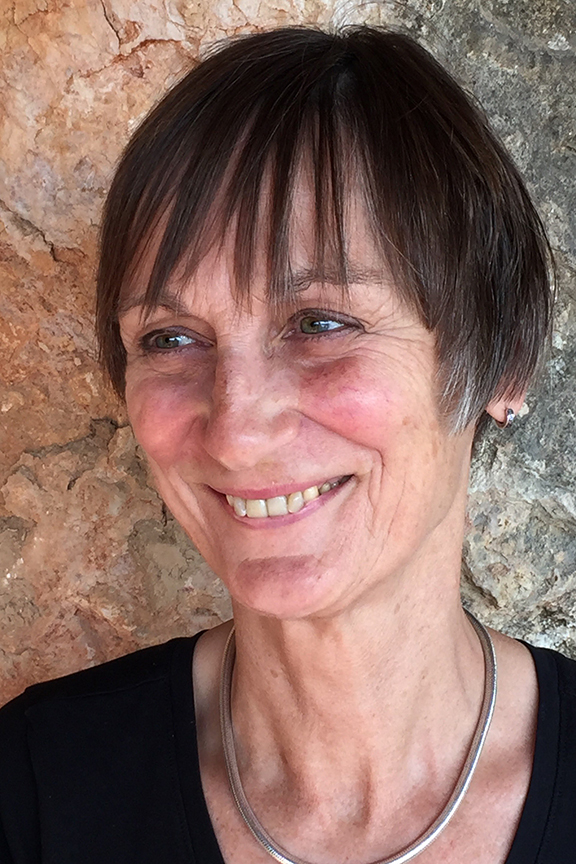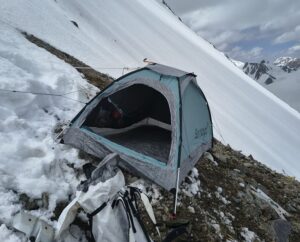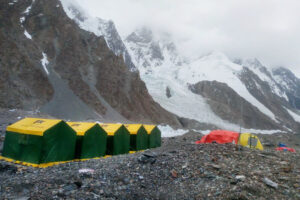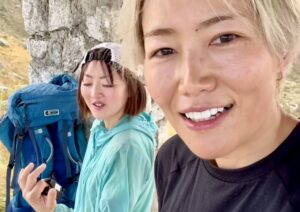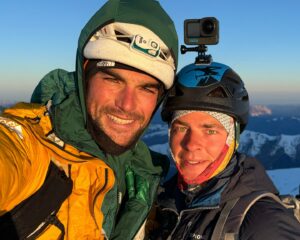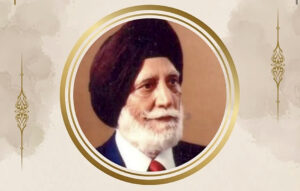It’s already been a tough year for the mountaineering community. Five lives have been lost on K2 and two more perished in an avalanche in the Italian Alps. The mountaineers left behind friends and families. Some had young children.
We spoke to author Maria Coffey about how families and climbers balance home lives with the risks inherent in high-altitude mountaineering. Coffey has authored or co-authored 10 books, including Where the Mountain Casts its Shadow, Explorers of the Infinite and Fragile Edge, which details her relationship with famed UK mountaineer Joe Tasker, who perished on Everest in 1982. Where the Mountain Casts its Shadow deals specifically with the effect of mountain deaths on families back home.
Our Comments section is divided over whether some of the missing K2 climbers have been “selfish” because they have children at home. Is climbing an inherently selfish act?
When I wrote my book, I decided to avoid making the judgment of selfish or addicted. But it was very interesting that most of the climbers I spoke to said, “Of course it’s selfish, how could it not be?”
They have this inherent need to climb and they make their own rationale for how and why they go. But as we drilled down, they often acknowledged that they weren’t doing this for their families; they had this deep need to climb. Particularly with something as dangerous as K2 in winter, there has to be some understanding that to go off and do this, you are putting your own needs above those of your partner, children, or parents.
After a mountaineering tragedy, the why of climbing is inevitably brought up. Is “because it’s there” enough?
It is a deep need for many climbers. Every human being needs transcendence, moments of stillness, moments of perfection. We all yearn for this and we all find it in different ways. Some of us get this from a beautiful sunset, from yoga, from running. But some people are wired in such a way that they can only find those moments doing something more extreme.
In my book Explorers of the Infinite, I interviewed a lot of climbers and was amazed that most of them didn’t balk at the idea of a spiritual need to climb. Many climbers have told me that they long to reach these moments of stillness when objectives are clear and life feels simple. I do wonder how much harder it is to find these moments now, with cellphones, sponsors, blog posts, and social media obligations.
What are the positives of pursuing a risky passion like climbing?
The world needs risk-takers. We are inspired by them. Inspired by their leaps into the unknown, pushing the boundaries of imagination and physical possibility, all those things that have always pushed explorers, from time immemorial, to explore. Discovering spiritual, physical, and mental territory is a deep need.
Would public judgments about Snorri, Mohr, and Sadpara be different if they were women?
Oh, absolutely. There was a furore regarding Alison Hargreaves when she died [climbing K2 in 1995] because she had young children. Her memory was ripped apart. Even before she left on her expedition, she was ripped apart in the press.
However, I think there is more discussion now, whether the climber is male or female. There is more equality in relationships too. There was a lot of blowback from mountaineers when I first published Where the Mountain Casts its Shadow. I felt like I was opening up the conversation and it’s been gratifying to see that these discussions are becoming more prevalent. Twenty years ago, you’d never have gotten the reactions you are getting on your website.
In your experience, what might the impact be on the families left behind?
It’s devastating. I think particularly when the person has died so far away and if the person has disappeared without a trace, it compounds the loss. If the bodies have been left on the mountain, there is no possibility of seeing the body to say goodbye. It can be hard to believe they have gone.
Of course, it is different for everybody. When I interviewed partners who had lost someone, many had found it very difficult to let themselves be angry. For me, that came a lot, lot later. You felt angry because the person had gone away but you don’t want to let that feeling in. But I think for me, there was the sense that there was another great love in my partner’s life. Partners at least have a choice, they have chosen to be with someone who is going to take these risks.
Likewise, for the children, there is no one pattern. There have been instances when a child has told me that the role of a parent was to protect them and that they couldn’t understand why their father or mother had put themselves before their child. Age can factor into the impact, but even very young children can feel the absence of the parent throughout their life. I had a very emotional interview with the daughter of Mick Burke who was lost on Everest in 1975. She spoke about problems in her relationships with men, a fear of being left. She described it as a shadow in her life.
We shouldn’t forget the parents either, the suffering for the parents is terrible too.
How do families deal with a major expedition?
These days, you can be in close contact during an expedition. I’ve spoken to people who have experienced expeditions before and after this technological change. Interestingly, they have said it is harder now, as you can’t switch off. Every time the phone rings or your phone beeps, it could be news. It can increase the stress level.
Some people build up a wall, I know I did this. It’s almost like a defense each time the person goes away, just to be able to deal with it emotionally. One woman told me that each time she built up this wall, she built it slightly higher and that eventually, she thought the wall would be so high her partner might not be able to come back in over it.
There is an element of denial. You have to block out the risks and believe that they are going to come back. Maybe some people are pragmatic enough to prepare for the loss of a loved one, but you can’t know how devastating it is until it happens.
How do climbers mentally separate their home life from the risks required in their professional life?
I was surprised how many mountaineers didn’t have wills, even those with children. Some would actually say, “Well, I’m not going to die.” They didn’t want to face that possibility. There were all these rationalizations. But the question that always stopped them in their tracks was, “What do you say to your children just before you leave on an expedition?” Without fail, they found the question very hard. Some broke down. It was a question they almost couldn’t bring themselves to answer.
I think that anybody who embarks on something so dangerous has to compartmentalize. In my book, I called them masters of denial. Climbers told me about how they change their focus away from home and toward the mountain. Joe and I didn’t discuss the risk of death often, because he didn’t want to talk about it, but I remember him saying once, “if I really think about what would happen to you if I die, I wouldn’t be able to go and climb, so I don’t think about it.” I think that sums it up really.
I’ve often been asked if mountaineers have a death wish. They definitely don’t, they have a life wish! They are among the most life-affirming people I have ever met.
Is family life ever really compatible with life as an 8,000m climber?
I’ve never had any regrets about my relationship with a mountaineer. But I was young and had a life ahead of me, and we didn’t have children.
Passing judgment is very difficult. I never wanted to take a hard line on that. If a climber survives, it is OK, right? Some climbers get away with it. Many famous mountaineers have families, have children. If they survive, there is no judgment. Unfortunately, there are those who don’t get away with it. Climbers risk breaking the hearts and shattering the lives of those who love them the most.
